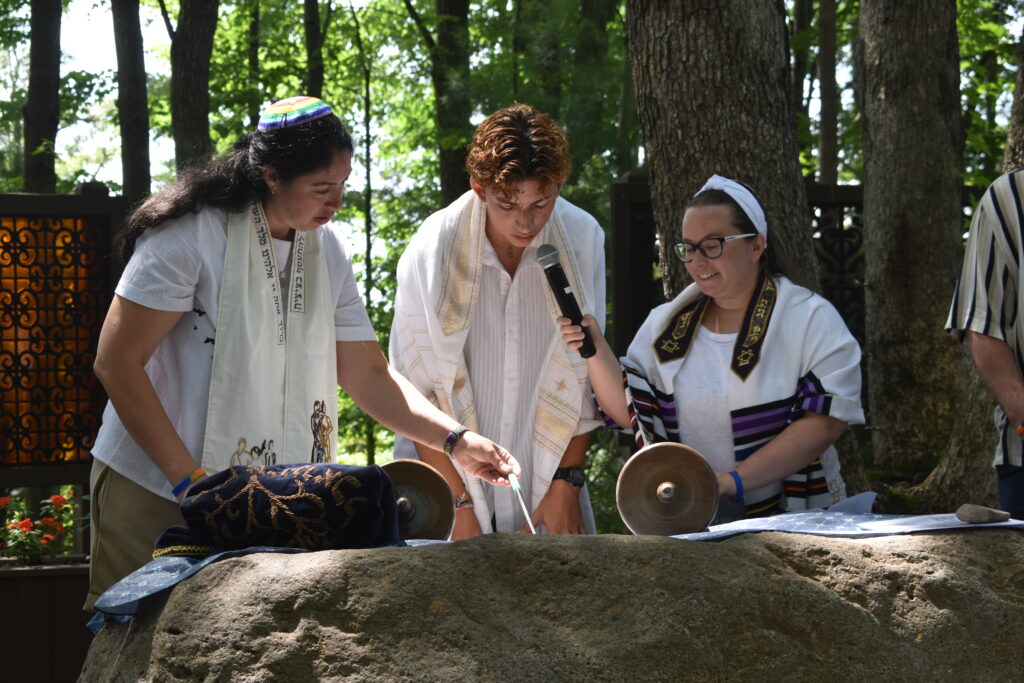 Shabbat Readings and Remarks from Arava Campers and Gesher Participants and Director Lisa David – July 21st and 22nd
Shabbat Readings and Remarks from Arava Campers and Gesher Participants and Director Lisa David – July 21st and 22nd
Arava’s Friday Night Service
Micah, Bryce, Jonah, and Eli
Micah: The Hashkiveinu is all about finding peace and sheltering yourself as well as others. Our middah, Tiferet, is about finding inner beauty and balance.
Bryce: I find peace when I’m on the baseball field and basketball court playing sports.
Jonah: My friends sheltered me when I was sad to leave camp.
Eg: I find peace when I’m at camp playing Gaga with my friends.
Jonah: It is important to be at peace with your inner self because if you aren’t you may not be able to be at peace with anything.
Bryce: If you’re unable to find inner beauty, you also may not be at peace with yourself.
Eg: We hope everyone is able to find a moment of peace as we join together.
Charlotte, Lilliana, Alexa
Alexa: This week’s middah is tiferet, which means inner beauty. What it means to me is most people are so focused on how they look on the outside all the time, that they forget that inner beauty is equally as important, if not more important.
Charlotte: It’s the beginning of the session and focusing on inner beauty and balance is important. When meeting new people it is very important to present yourself by your personality. In hard times it is also important to find inner balance.
Lilliana – So the message you can take from this is: even if you are in a hard place, you can still find inner beauty and balance within yourself. 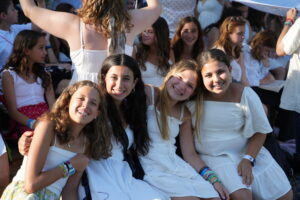
Jacob G, Ellis W, Max L. Josh Z, Atticus L
Atticus: You look in yourself and you hear three voices
Josh: One of yourself, one of your judging self, and one of God
A: You yourself are beautiful but still have flaws
J: An your judging self can only see flaws and sometimes you should listen
A: But the third voice the voice of God, only sees beauty
A: Two years ago, I was homesick at camp and I thought it was going to be a horrible summer. I didn’t feel good about myself but the friends I didn’t know I had helped me feel great about myself and I had fun.
J: Last year I was the unathletic kid and one of the least popular. I though I would end up with no friends but my bunkmates came around and showed me my inner beauty and they gave me balance.
Both: Todah and Shalom Camp Harlam, we rise for the Shma if it is your custom.
Ani, Liv, Shoshana, Maya, Naomi
All: Shabbat Shalom!
Ani: On this Shabbat, we are focusing on tiferet, which means finding inner beauty and balance.
Shosh: You can find inner beauty and balance in the littlest things.
Naomi: We looked inside of things to find inner beauty. For example, a water bottle: it has water, which connects us to so many fun activities.
Maya: We were always told to never judge a book by its cover. Until you open up the book, and there is a whole story inside.
Liv: Our story is just starting for us this summer. Last year we were all in the same bunk, and now I’m in a different one. Even though we’re not all together, we’re opening this new chapter, having fun while making new friends.
Shosh: Right now, we’re sitting at the Chapel on the Hill. On the outside, its just a landmark that everyone in the camp is familiar with. But here tonight we’ll find the inner beauty, in singing and praying together this Shabbat.
Julia K, Naomi R, Elsie, and Chloe K
Chloe – The Mi Chamocha talks about freedom.
Julia – This connects to finding inner beauty and balance in many ways.
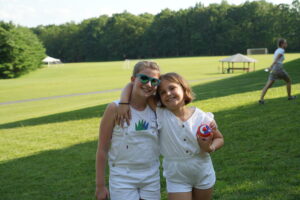
Naomi – The Mi Chamocha is about when Moses parted the Red Sea and led the Israelites to freedom.
Elsie – When the Israelites were enslaved, they weren’t always able to find inner beauty and balance.
Chloe – But when they were finally free and able to practice their religion, they found their inner beauty and balance.
Julia – As we sing the Mi Chamocha we invite you to think about your freedom and what it means to you.
Jane, Caroline, Lucy, and Jordan
Caroline – Our next prayer, the Ma’ariv Aravim, symbolizes the contrast of beauty in day and night. It reminds us to look for beauty in anything and everything.
Jane – Some challenges remind us to look for inner beauty in ourselves and help others find their inner beauty.
Lucy – When I first came to camp last year, I was nervous about being away from home and making new friends. But these were the people who helped me through it and find tiferet, inner beauty and balance in camp.
Jordan – Balance can be hard to find. Whether it’s balancing school and activities, friends and homework, or family and your phone, balance is difficult to maintain with everything happening in your environment. Still we manage to find the inner beauty in the world.
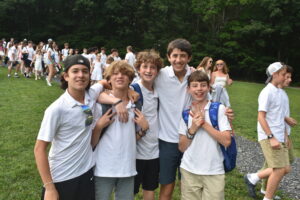
Sam, Chloe B., Natalie, and Jules
All – Welcome Home
Sam – When we enter camp, we are greeted with warm hugs, smiling faces, and screaming voices shouting Welcome Home.
Chloe – Welcome home means to me that I’m always surrounded by the happiness of my friends.
Jules – How is this connected to Shabbat? This is connected to Shabbat by the Barchu. What is the Barchu?
Natalie – The Barchu is an invitation to prayer. It invites each and every one of us, no matter who we are, together as a community.
All – Na La-Koom. Please rise for the Barchu
Blog Posts
Isaac S, Jack L, Ethan D, Dylan G, Micah C
Tiferet is the middah of finding inner beauty and balance. It means something different to each of us so we asked each of us working on this blog post what it means to them.
Isaac: I think it means appreciating yourself and cultivating a continued passion for my interests to feel like I have a direction so I personally can feel balanced.
Micah: I think it means feeling good about yourself and having self-confidence. If you’re going through a challenge, don’t give up.
Jack: I think it means finding yourself in overcoming a challenge, like going to the top of the big swing.
Ethan: I think a good example of tiferet at camp is at Kab Shab when everyone is singing together.
Dylan: I think a good example of tiferet is when I went on the stream hike.
However you find tiferet, we can all agree it is there and it is important. Tiferet binds everyone together and possibly even more importantly, binds us to ourselves.
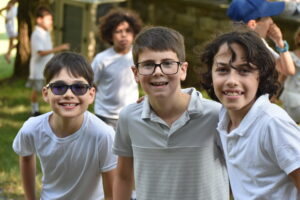 Ella R, Sophia P, Sari H, Haley R
Ella R, Sophia P, Sari H, Haley R
What is inner beauty? If you asked us what inner beauty is, we would say: it is finding good in yourself and others. At camp, finding inner beauty comes in many different forms. Finding inner beauty at camp can help improve your experience as a camper.
We found inner beauty at camp when we had the courage to be ourselves, despite what others said. At Shabbat, we can reflect on ourselves and our past week. This can help us find inner beauty by looking back at our actions. When we pray, we can look within ourselves and find the light that shines inside of us.
In conclusion, tiferet, or inner beauty, can be shown in so many ways at camp. Finding your inner beauty is so important because it can enhance our daily life and how we interact with others and ourselves.
D’Var Torah from Lisa David, Director
Shabbat shalom. Tonight, we have had the opportunity to hear so many beautiful thoughts and reflections on one of Harlam’s middot, Tiferet – finding inner beauty. Already, in these first few days of the session, our shared experiences – whether it be completing the challenges at the low ropes course, working together during nikayon to get that high score for the Golden Plunger, or working together on dances for
tomorrow’s MTV night – have helped us to see that we value and connect to one another here not because of what we see on the outside, but because of what each of us brings from deep inside.
When we talk at Harlam about inner beauty, we speak of the qualities that make each of us unique and special. It’s the kindness we show to others, the compassion we extend, and the love we share. It’s the willingness to lend a hand to a friend, to listen without judgment, and to treat everyone with respect and dignity.
Maybe when you arrived here on the first day, you made some judgments about your new bunkmates and unit-mates from what they wore – the teams represented on their t-shirt or hat – or maybe what they said, as you guessed what they were like or where they were from based on their accents. Maybe you judged them based on stories you heard from others about other summers, or events at home. But it’s a new year, a new summer, a new session, and a fresh start for all of us. And at Harlam, we know that what really matters is what is inside. We know that each person brings value and should be included, and that our community is diminished if even one of us is not here.
We have the luxury of time together – so much time in the days and weeks ahead – and I want to challenge each of you to go deeper than that t–shirt or that accent or that first impression. Discover what makes each person around you so special, because all of you are special. Find the unique talent, skill, story or value that each person brings, and celebrate it. Be curious, ask questions, assume goodwill and be patient so that the inner beauty of those around you can be discovered and celebrated, and so others can celebrate you. Make Harlam a place where we all can belong.
I look forward to discovering and celebrating how beautiful each of you are and making Harlam a warmer and more welcoming place in the process. Shabbat shalom!
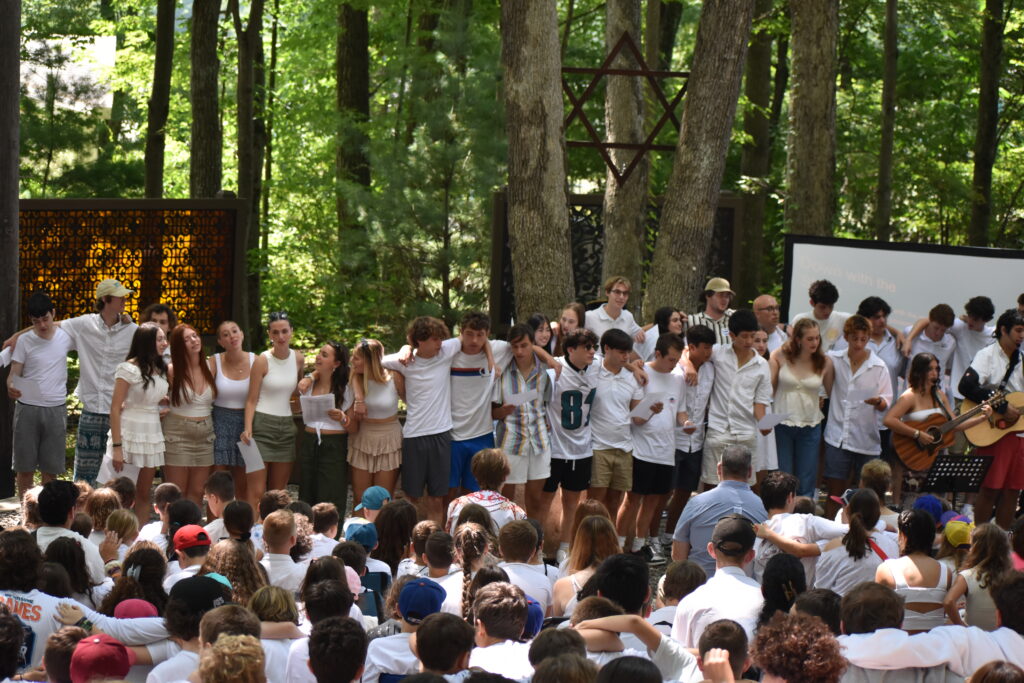 Gesher’s Saturday Morning Service
Gesher’s Saturday Morning Service
Mikey, Cooper, Izzy
Mikey: Hey guys, what is Gesher?
Cooper: Honestly, not really sure, but we can share what our participants have described to us…
Izzy: Staff?
Cooper: Camper?
Izzy: Half staff half camper?
Cooper: Stamper?
Izzy: Constantly confused about where they’re supposed to be?
Cooper: An extra set of eyes, but still not coverage?
Mikey: The cool aunt or uncle?
Izzy: What we’ve seen Gesher be is a group of people who genuinely love one another and Camp Harlam. People who help make camp the best it can be, whether it be through hyping people up on opening day, running a carnival for all of camp, designing an end-of-session banquet, or spreading their endless love of camp to their campers.
Cooper: We sit back in awe of how much these young adults have grown within the past six weeks. This summer is designed to bridge the gap between being a camper and a staff member. Besides gaining the skills of what it takes to be a staff member, little did these mentees know that they were gaining so much more. They’ve learned how to navigate boundaries, advocate for themselves, how to listen not just hear, how to lift each other up and take care of their own GMESSH.
Mikey: Getting a peak behind the curtain is fun but also hard to navigate as I am sure these stampers have figured out by now. Boundaries are pushed, limits are tested, you make mistakes and you learn. Camp is truly the best environment to do all of those things because here, growth is the end goal.
Mikey: So Gesher, Come back to this place, summer after summer. The more you make an impact on your campers, the more of an impact they will make on you. If you stick around long enough, you might even see your own campers experience the magic of Gesher.
Together: 1…2…3… Shabbat Shalom
Brendan, Harrison, Saph
Saph: When I had lost my first 7 color wars starting in Carmel, I felt very discouraged and upset because it seemed as if everyone around me had won. However, I chose to stay positive and put all of my effort into my final color war as a camper, knowing this could be one of my last opportunities to win. In the end, my dedication and hard work paid off and I reached the light at the end of the tunnel, winning my first color war 2nd session Chavurah.
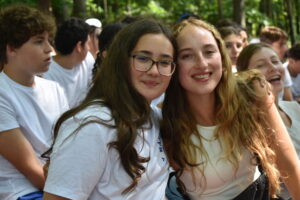 Brendan: Going into this summer, I was excited to be with my friends but also nervous to be with campers. I wanted to be the CIT everyone would like but I also needed to enforce rules. The first few days of camp, I was really nervous and anxious constantly, wondering if I was doing good or not. But I looked to the bright side and did the things I love, such as basketball, swimming, and pickleball.
Brendan: Going into this summer, I was excited to be with my friends but also nervous to be with campers. I wanted to be the CIT everyone would like but I also needed to enforce rules. The first few days of camp, I was really nervous and anxious constantly, wondering if I was doing good or not. But I looked to the bright side and did the things I love, such as basketball, swimming, and pickleball.
Harrison: We all experience negative events at some point. It’s important to learn to enjoy the little things rather than emphasize the bad ones, like a rainbow after a thunderstorm. Looking to the bright side can help improve your overall mood and enjoyment of everyday life.
Hannah Gerstel and Sarah
As a CIT, we have the unique privilege of experiencing many different parts of camp, bridging the gap between what it means to be both a camper and counselor. During first session, CITs have the opportunity to work with multiple age groups. While I really enjoyed meeting many different campers during first session, second session is where I really get to feel like a counselor because I am a part of one bunk. Getting to know the ins and outs of my bunk, G1, has allowed me to feel closer to camp than I ever had.
During the first session, I experienced different units and particularly enjoyed Sharon. I formed a bond and connection with my cabin during CIT summer. Although I miss waterfront and water Zumba, I am so happy to be able to contribute to making my K’ton campers have so much joy and laughter during this summer at Camp Harlam. I am excited to get to know my campers, continue to grow, and learn during the second session of camp.
We have both thoroughly enjoyed our time thus far in the Gsher program. Thank you to the Gesher program and Camp Harlam for this amazing experience for teaching how to be the next generation of leaders.
Abi L , Joel S, Campbell W
Here at camp the Gesher unit is not staff or campers we are participants. Because of our experiences during 1st session we finally understand the impact camp has on people. Being able to interact with different units and departments, our perspective of camp has changed for the better.
Now, we not only see camp as a fun place to get away, but instead a place where we can learn how to be our best selves. Knowing that your camper trusts you enough to share their feelings makes one feel like their presence was important. I had a camper last session who used to squeeze my hand 5 times anytime she needed something. The simple act of squeezing my hand doesn’t sound very significant, but the fact that she trusted me enough to do that made me feel like I used my best self to help her.
As we continue into the silent prayer, we hope that you all can reflect on the things that camp has taught you and we know you’ll all leave an impact on each other as camp left an impact on us.
Shayna, Ava, and Sam
Everyone: Shabbat shalom
Ava: While navigating our way through this new experience, our Gesher journeys have taught us how to feel comfortable with new beginnings and face challenges that have shaped not only who we are as CITS but also as human beings.
Shayna: The bridge that is gesher has connected our past to our future, allowing us to see Camp in a different light. While we are still considered a unit and living with our friends, we have taken on new responsibilities. Throughout this summer, we have explored new perspectives and adapted to our new role at camp.
Sam: coming back this summer was not only to continue to make everlasting memories but to also give back to the place that has brought us joy year after year without fail. camp has been a safe place for us and will continue to do so no matter what path we follow. 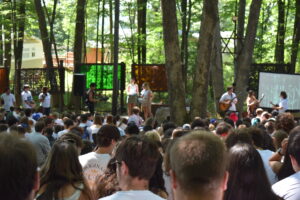
Ava: as we approach our final steps on this bridge, we reflect on our summers as campers and hope that we are able to impact future generations the way camp affected us.
Jillian, Sophie, Elle
Jillian: We’d like to start by checking in with everyone here. Show us how you are feeling on your fingers on a scale of 1-5, 5 being great and 1 being not so great. Throughout this summer, we have used check-ins like this to reflect on our experiences throughout the week.
Sophie: Something not only these check-ins, but also this summer has helped us realize is that you may not always be at a 5, and that is okay. After numerous programs with our supervisors and other staff, we have learned how to prioritize our needs while also prioritizing the needs of our campers.
Elle: Camp is such a special place that provides unique ways to take care of yourself, so take the time to star gaze on the basketball court in the RAH village, walk the fire trail from woodside to the sports palace, or lay on a bench in the chapel on the woods and just breathe. Whichever way you choose to take care of yourself, make sure to take a mental snapshot of that moment and hold onto it forever, because before you know it, you will be crossing the bridge, just like us.
Ben, Hart, Matt
Ben: The Mi Chamocha is an opportunity to celebrate our freedom, the liberation we felt in Egypt.
Hart: As CITs, we take this year in a similar light.
Matt: It’s an opportunity to celebrate our last year of being a camper while also transitioning into our role as a counselor.
Ben: So far, we’ve celebrated:
Hart: Our new freedom, boundaries, and extended curfew.
Matt: Coming back to camp with our best friends after two years away.
Ben: Feeling the new privileges and responsibilities that come with being a counselor.
Hart: Watching our campers experience the same joy we did.
Matt: And giving back to the community that has built us all so much.
(Pause)
Ben: But our time here at camp is limited and slips by so fast.
Hart: And it’s easy to get caught up on the things you wish you had, but it’s important not to go through life with a negative mindset.

All: Shabbat Shalom.
Blog: This week we are honoring our Gesher participants for all of their hard work and dedication these past few weeks. Joined by their family and loved ones this Saturday morning, the CITS of 2023 will talk about their experiences in the program and how their time in the bridge has helped them grow. As their time as Gesher comes to a close, the cits are reflecting on not only the impact they have had on their campers, but also the impact the campers have had on them. This has been a summer of maturing and learning for Gesher and they are looking forward to taking these lessons and skills learned out of camp and into the real world.
Shabbat Sha-Rap
Saturday morning and the peeps are here
It’s time for Shabbat – let me get a cheer
We’ll talk about Moses, Aaron, the Levites too
Ayyoo Jamie, you know what to do
Devarim’s the Parshah, “the words” it’s named,
In Deuteronomy 1:1, Moses proclaimed,
To Israel’s children, he spoke so clear,
Recalling their journey, hope, and fear.
Rebuking their failings, iniquities too,
Urging to keep Torah, for a future anew,
The Promised Land, their eternal space,
After his death, they’ll reach that place.
Through desert fearsome, they wandered far,
Spies sent out, but faith did mar,
G‑d decreed, a price they’d pay,
No Promised Land for that lost array.
Ammon and Moab blocked their way,
Wars against kings they had to slay,
Settling lands, their heritage embraced,
A chosen people, by destiny graced.
To Joshua, he passed the guiding light,
“Fear not, G‑d’s with you in the fight,”
In battles for conquest, they’ll stand tall,
United, they’ll rise and never fall.
So heed Devarim’s words, wisdom profound,
Learn from the past, let faith resound,
In the Promised Land, their heritage blessed,
With G‑d’s grace, they’ll pass every test.
